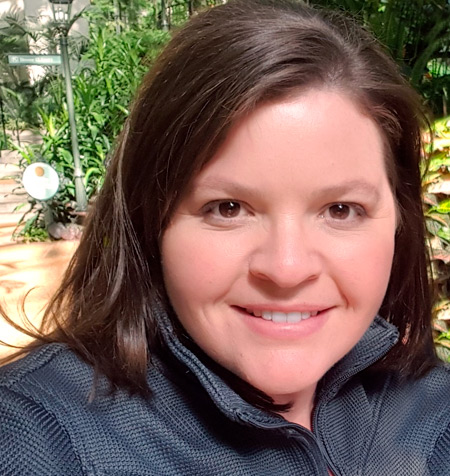Sep. 1, 2016
 One of the poorest hospitals in Guatemala has the most dedicated staff I’ve ever seen. Most of the staff at the Incan Cancer Hospital in Guatemala City can’t make do on the minimal paychecks they receive. The hospital closes at noon so the staff can work at private practices in the afternoon to make a living.
One of the poorest hospitals in Guatemala has the most dedicated staff I’ve ever seen. Most of the staff at the Incan Cancer Hospital in Guatemala City can’t make do on the minimal paychecks they receive. The hospital closes at noon so the staff can work at private practices in the afternoon to make a living.
As soon as I arrived to make the project assessment, it was easy to see that this hospital needed a lot of help. "Busy" doesn’t even begin to describe what I saw. The halls and waiting rooms were packed with people waiting to be seen and treated. Most of the patients had already been diagnosed with cancer and were there for treatment and for help managing the pain associated with the disease.
It opened my eyes, as I’m sure it would anyone’s, to see the patients’ distress as they were crowded in the hallways and waiting rooms. We didn’t speak the same language, but it was easy for me to understand they have a need for help. Every day, I work with cancer patients at Barnes Jewish Hospital (BJC) in St. Louis, Missouri, so I’m aware of many options for providing care, fighting cancer and managing patients’ pain. Unfortunately, many of these comforting and lifesaving options are not available to the patients at Incan Cancer Hospital. It was very hard for me to see patients suffering when I know more advanced care exists.
Siemens recognizes the importance of proper training and believes that everyone should have access to good basic medical care. That is why they created the Siemens ASRT Foundation Outreach Fellowship. The ASRT Foundation, in partnership with Siemens and RAD-AID International, is helping to identify and support communities in desperate need of better medical care. It is because of this desire to improve health care around the world that I was able to help the patients at Incan Cancer Hospital in Guatemala.
I wanted to do everything I could to help these people. I threw myself into discovering everything the hospital needed to better support R.T.s and improve patient care. After evaluating patient demographics, hospital infrastructure, financial resources, equipment and tests available, and talking with the hospital staff, we identified a long list of things that required special attention from future project teams. Two major issues emerged during our evaluation that your support can help address: the need for updated equipment or the repair of broken equipment and the need for a picture archiving and communication system (PACS).
The professionals I worked with at Incan Cancer Hospital face daily obstacles of equipment failure and the reality of not having funding and/or resources to make critical repairs. The hospital has limited equipment to meet patient needs, including computed tomography, ultrasound, radiography and radiation therapy. If any of this vital equipment breaks, they are left with no means to complete the necessary treatment for the patient.
Over and over again, the local doctors told me they needed a picture archiving and communication system (PACS). They struggle with providing ongoing treatment because the patient’s imaging history is frequently unavailable. Therefore, the absence of a PACS means the tracking of the patient’s disease progression and treatment may be challenging. In addition to the installation of a PACS, it would be essential to have training and ongoing maintenance plans for the system to ensure its availability.
Along with the equipment needs, the R.T.s at Incan Cancer Hospital don’t have access to the training information R.T.s in the United States do. Most do not even have regular access to computers for immediate work needs, let alone for education and training. As a donor you can be a part of providing the training your fellow R.T.s in Guatemala so greatly need.
Experiencing firsthand how badly Incan Cancer Hospital and its patients need our help has changed me. I know it would change you too. I’m committed to doing everything I can to help the people of Guatemala and hope you’ll join me in supporting outreach projects like this one. This hospital and its staff improve the care for the people of Guatemala, just like so many of the ASRT Foundation and RAD-AID projects do around the world.
This fall, I’ll be speaking at the RAD-AID International conference in Washington, D.C., to present the assessment we completed. I’m also looking forwarding to helping coordinate others to go and address the needs we identified on this first mission.
My time in Guatemala has ended and it is my hope that the Foundation and RAD-AID will be able to continue their outreach efforts at Incan Cancer Hospital and at other project sites. I intend to do everything I can to help make sure these outreach efforts continue, and I urge you, my fellow members of the R.T. community, to support future outreach projects that address the issues hospitals and patients face around the world. I assure you that if you were to see what I did, you would do everything you could to help.
The ASRT Foundation, donors, volunteers and RAD-AID do a lot of good through worldwide community outreach efforts like the one I volunteered for in Guatemala City. Every donor and outreach volunteer makes a difference in the lives of the patients who crowd into hospitals every day hoping to receive treatment and ease the pain of their disease.
Please consider making a gift to the ASRT Foundation today to support their many community outreach efforts.